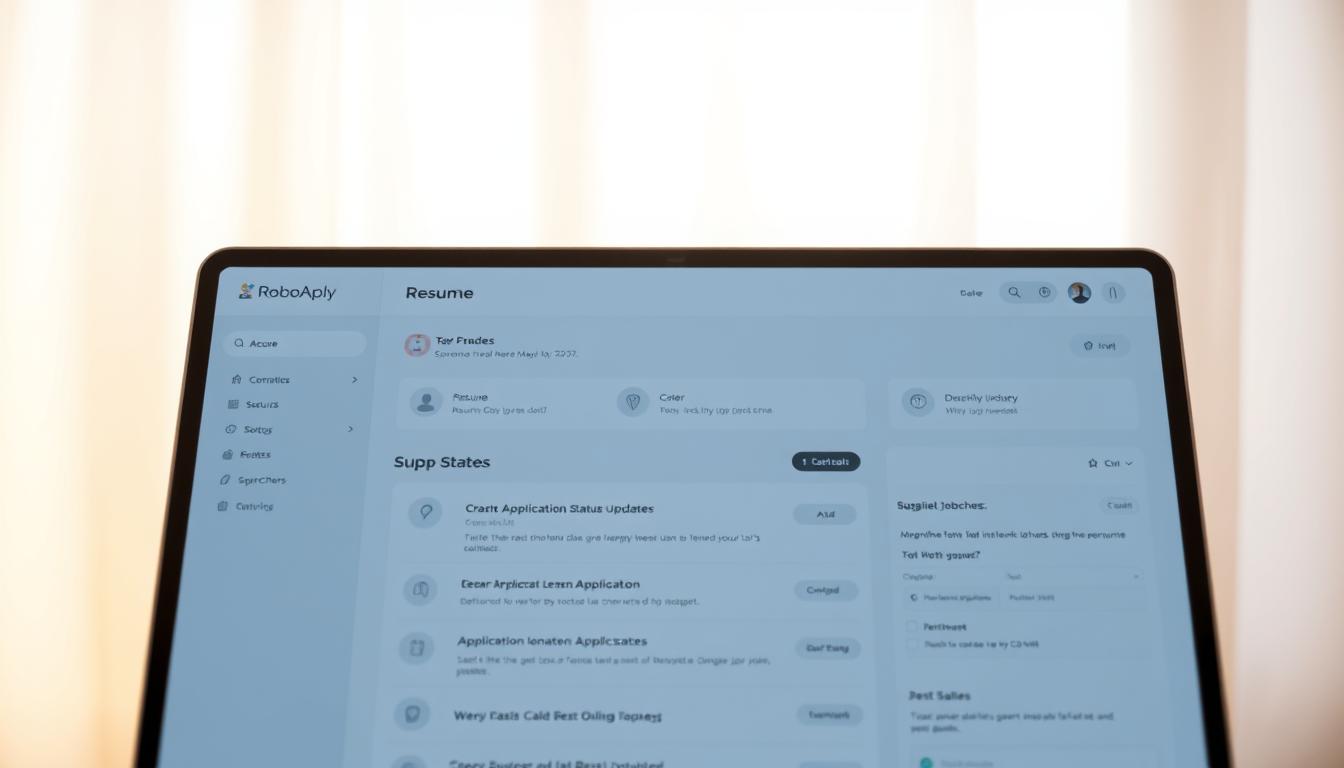Crafting a standout Medical Interpreter Resume can feel like a puzzle, right? You’ve got to show off your language skills, your medical knowledge, and how well you understand different cultures, all on one page. This guide is here to help you figure out how to put all those important details on paper so that potential employers really see what you bring to the table. We’ll go through some examples and tips to make your resume shine, powered by RoboApply.
Key Takeaways
- Always make sure your resume clearly shows your language skills and any certifications you have for medical interpreting.
- When you list your experience, focus on what you achieved, not just what you did. Use numbers and percentages to show your impact.
- Tailor your resume for each job you apply for. Look at the job description and make sure your resume uses similar words and highlights relevant skills.
1. Entry-Level Community/Medical Interpreter Resume

So, you’re just starting out? No problem! An entry-level resume is all about highlighting your potential and eagerness to learn. Think of it as showcasing your raw talent and the skills you do have, even if they’re not from direct work experience. RoboApply can help you structure this information effectively, making sure your resume emphasizes your strengths.
1 year of internship and volunteer experience
Okay, so you might not have years of paid experience under your belt. That’s totally fine! This is where your internships and volunteer work shine. Think about it: you’ve been in the field, you’ve seen how things work, and you’ve probably picked up some valuable skills along the way. Don’t underestimate the power of these experiences.
Here’s what to focus on:
- Specific tasks: Did you assist with patient intake? Were you responsible for translating documents? List those tasks out!
- Skills used: Did you use specific interpreting techniques? Did you improve your cultural competency? Mention those skills!
- Quantifiable results: Did you help improve patient satisfaction scores? Did you reduce communication errors? If you can measure it, include it!
Remember, even seemingly small contributions can make a big difference on your resume. It’s all about how you frame them.
Think about including a section dedicated to language skills. Be specific about your proficiency level (e.g., fluent, proficient, conversational) and any certifications you have. This is especially important for medical interpreter jobs. Also, don’t forget to tailor your resume to each specific job you’re applying for. Use keywords from the job description to make sure your resume gets past those pesky Applicant Tracking Systems (ATS). You can also use RoboApply to help you with resume examples and templates.
2. Legal Interpreter Resume
Legal interpreting is a specialized field, and your resume needs to show you understand the nuances of the legal system. It’s not just about knowing two languages; it’s about understanding legal terminology and procedures. A strong legal interpreter resume highlights your experience in courtrooms, depositions, and other legal settings. Let’s get into it.
RoboApply can help you tailor your resume to specific legal interpreter positions, ensuring you highlight the most relevant skills and experience.
Here’s what to keep in mind:
- Accuracy is key. Legal settings demand precise interpretation. Highlight any certifications or training that demonstrate your commitment to accuracy.
- Confidentiality matters. Legal interpreters often handle sensitive information. Emphasize your understanding of and adherence to confidentiality protocols.
- Experience counts. If you’ve worked in specific areas of law (criminal, civil, etc.), make sure to mention it. This shows you’re not just a general interpreter, but someone with relevant experience.
A well-crafted legal interpreter resume showcases not only your language skills but also your understanding of the legal system and your commitment to ethical conduct. It’s about building trust with potential employers by demonstrating your readiness to handle the demands of this specialized field.
Think about including specific examples of cases you’ve worked on (while maintaining confidentiality, of course). Did you help a client understand complex legal jargon? Did you ensure accurate communication during a critical deposition? These details can make your resume stand out. Also, consider adding a section for relevant legal terminology you’re familiar with. This shows you’ve done your homework and are prepared for the job. Remember to tailor your resume to each specific job application, highlighting the skills and experience that are most relevant to the position. A generic resume won’t cut it in the competitive field of legal interpreting. Make sure to include your interpreter resume examples to showcase your skills.
3. Conference Interpreter Resume
Conference interpreters work in high-pressure environments, often dealing with complex topics and demanding clients. Your resume needs to show you can handle it. It’s not just about knowing languages; it’s about precision, quick thinking, and professionalism. RoboApply can help you tailor your resume to highlight these skills.
5 years in business conferences and UN-style meetings
This section is all about showing your experience in the field. Quantify your achievements whenever possible. Instead of just saying you "interpreted at conferences," say you "Interpreted at 20+ international business conferences, facilitating communication between 500+ attendees." Numbers speak volumes.
Here’s what you should include:
- Conference Types: List the types of conferences you’ve worked at (e.g., medical, technical, legal).
- Languages: Clearly state your language pairs and your proficiency level in each.
- Skills: Highlight skills like simultaneous interpreting, consecutive interpreting, and sight translation.
Remember to tailor your resume to each specific job application. A generic resume won’t cut it in the competitive field of conference interpreting. Focus on the skills and experience that are most relevant to the position you’re applying for. Use action verbs to describe your accomplishments and make your resume stand out. Consider using a resume builder to help you format your resume effectively.
Here’s an example of how to present your experience:
| Conference Type | Languages | Skills | Achievements |
|---|---|---|---|
| International Business | English/Spanish | Simultaneous, Consecutive | Facilitated communication for 500+ attendees, resulting in positive feedback |
| Medical Symposium | English/French | Sight Translation, Terminology Mgmt | Ensured accurate interpretation of complex medical terminology |
| Legal Conference | English/German | Consecutive, Note-Taking | Provided accurate interpretation in high-stakes legal proceedings |
By showcasing your experience and skills in a clear and concise manner, you’ll increase your chances of landing your dream job as a conference interpreter. Make sure to proofread your resume carefully before submitting it. A well-written and error-free resume demonstrates your attention to detail and professionalism. Consider using a resume template to ensure your resume is well-organized and visually appealing.
4. Remote Interpreter Resume
Remote interpreting is booming, and your resume needs to show you’re ready. It’s not just about knowing languages; it’s about mastering the tech and staying sharp in a virtual environment. Let’s get into what makes a remote interpreter resume stand out.
Think of RoboApply as your co-pilot, helping you fine-tune your resume to highlight the skills that matter most to remote employers.
Here’s what to keep in mind:
- Highlight your tech skills: List specific platforms you’re familiar with (Zoom, Teams, etc.).
- Showcase your experience: Detail any remote interpreting work you’ve done, even if it was freelance or volunteer.
- Emphasize soft skills: Communication, adaptability, and problem-solving are key in a remote setting.
Remote interpreting demands a unique skill set. Your resume should clearly demonstrate your ability to provide accurate and effective interpretation while navigating the challenges of a virtual environment.
To make your resume shine, focus on these points. A well-crafted resume can significantly improve your chances of landing that remote interpreter job. Remember to tailor your resume to each specific job application, highlighting the skills and experiences that are most relevant to the position. For example, if a job emphasizes medical interpreting, be sure to highlight your medical assistant resume experience and certifications.
5. Senior Interpreter Resume

When you’ve been in the interpreting game for a while, your resume needs to show it. It’s not just about listing jobs; it’s about highlighting your impact and the breadth of your experience. Think of it as showcasing your career’s greatest hits. RoboApply can help you tailor your resume to emphasize your accomplishments and demonstrate your value to potential employers.
A senior interpreter resume should emphasize leadership, mentorship, and significant contributions to the field.
Here’s what to keep in mind:
- Quantify your achievements: Instead of saying "Improved communication," say "Improved communication, resulting in a 15% increase in patient satisfaction scores."
- Highlight specialized knowledge: Mention any specific areas of expertise, like medical terminology or legal procedures.
- Showcase leadership: If you’ve mentored junior interpreters or led training sessions, make sure to include that.
A senior interpreter resume isn’t just a list of jobs; it’s a story of professional growth and impact. It should demonstrate not only your skills but also your ability to lead, mentor, and contribute to the field.
Think about including a section on professional development, listing workshops, conferences, and certifications you’ve obtained over the years. This shows a commitment to staying current in the field. Also, don’t forget to tailor your resume to each specific job you’re applying for. Use keywords from the job description to make sure your resume gets past those pesky applicant tracking systems. You can also use a resume summary to highlight your key skills.
6. Resume Format

Choosing the right resume format is super important. It’s like picking the right outfit for an interview—it needs to make a good first impression. The format you pick can really highlight your strengths and downplay any weaknesses. Let’s break down some key things to think about.
Chronological, Functional, or Hybrid?
There are three main types of resume formats:
- Chronological: This is the most common format. It lists your work experience in reverse chronological order, starting with your most recent job. It’s great if you have a steady work history and want to show career progression.
- Functional: This format focuses on your skills rather than your work history. It’s useful if you have gaps in your employment or are changing careers. If you want to emphasize your skills, consider the functional or hybrid formats.
- Hybrid (or Combination): This format combines elements of both chronological and functional formats. It allows you to highlight both your skills and your work experience. It’s a good option if you want to showcase specific skills while still providing a clear work history.
Key Formatting Elements
Here are some important things to keep in mind when formatting your medical interpreter resume:
- Header: Make sure your header includes your name, contact information (phone number, email address), and professional social media links (like LinkedIn, if applicable). Double-check that all the info is accurate!
- Font: Choose a professional and easy-to-read font like Arial, Calibri, or Times New Roman. Keep the font size between 10 and 12 points.
- Margins: Use standard margins (around 1 inch) to create white space and make your resume easier to read.
- Length: Ideally, your resume should be one page long. If you have a lot of experience, it’s okay to go to two pages, but try to keep it concise and relevant. A one-page resume is standard, but if you have extensive experience, extending to two pages is acceptable.
- File Type: Save your resume as a PDF to preserve the formatting. This ensures that your resume will look the same no matter what device or operating system it’s viewed on.
RoboApply Can Help
Creating a perfectly formatted resume can be a pain. That’s where resume templates come in handy. RoboApply offers a bunch of templates that are already formatted, so you can just plug in your information and go. It takes the stress out of formatting and makes sure your resume looks professional. You can also build resumes with RoboApply or create cover letters using a free tool.
7. Resume Experience

Your experience section is where you really show what you’ve done. It’s not just about listing jobs; it’s about showing how you’ve used your skills and made a difference. Think of it as your chance to prove you’re the right person for the job. RoboApply can help you tailor this section to match specific job descriptions, making sure your most relevant experience shines.
Quantify Your Achievements
Numbers speak louder than words. Instead of saying you "handled a lot of clients," say you "managed a caseload of 50+ clients per week, ensuring accurate communication and satisfaction." Quantifying your achievements makes your impact clear and measurable.
Use Action Verbs
Start each bullet point with a strong action verb. Instead of "Responsible for scheduling appointments," try "Coordinated and scheduled over 200 medical appointments monthly, optimizing patient flow and minimizing wait times." Action verbs make you sound proactive and capable.
Tailor to the Job Description
Read the job description carefully and identify the key skills and experiences they’re looking for. Then, make sure your experience section highlights those specific areas. Don’t just copy and paste from your generic resume; customize it for each application. For example, if the job emphasizes community outreach, highlight any experience you have in that area.
Example Experience Section
Here’s an example of how to format your experience section:
Medical Interpreter | ABC Hospital | 2020 – Present
- Provided accurate and culturally sensitive interpretation services in a fast-paced hospital environment.
- Managed a caseload of 30+ patients daily, facilitating communication between patients and medical staff.
- Translated medical documents and instructions, ensuring patient understanding and compliance.
- Reduced communication errors by 15% through effective interpretation techniques.
Freelance Interpreter | Self-Employed | 2018 – 2020
- Provided interpretation services for legal, medical, and educational settings.
- Developed a client base of 20+ regular clients through networking and referrals.
- Maintained a 98% client satisfaction rate based on feedback surveys.
Remember, the experience section is your chance to sell yourself. Use it to showcase your skills, achievements, and the value you can bring to the organization. Make sure it’s clear, concise, and tailored to the specific job you’re applying for. Don’t be afraid to brag a little – just back it up with facts and figures.
When crafting your resume, remember to focus on the interpreter CV and how it emphasizes your skills. If you’re looking for a guide, there are resources available to help you create an effective medical interpreter resume. You can also find interpreter resume samples to help you perfect your application. Remember to choose a suitable format and include all relevant information to create an effective interpreter resume.
Want to make your resume stand out? It’s super important to show off your work history in the best way possible. A great resume can help you get noticed by companies. If you need a hand making your resume shine, check out RoboApply. We can help you make a really good one!
Wrapping Things Up
So, there you have it. Making a good medical interpreter resume really comes down to showing off your language skills, your medical knowledge, and how well you understand different cultures. It’s not just about listing what you’ve done; it’s about making those things clear and easy for hiring managers to see. By using the tips and examples we talked about, you can put together a resume that really gets noticed. Remember, every job application is a chance to show what you can do, so make it count!
Frequently Asked Questions
What important things should I put on my medical interpreter resume?
A medical interpreter’s resume should clearly show your language skills, knowledge of medical words, and understanding of different cultures. Highlight specific situations where you helped doctors and patients talk to each other, especially if you worked with different types of medical problems or in different healthcare places. RoboApply can help you make these parts stand out.
How can I make my medical interpreter resume more impressive?
To make your resume stronger, use numbers and facts to show your achievements. For example, instead of saying ‘Helped many patients,’ say ‘Helped over 20 patients daily in emergency care.’ Also, make sure to use keywords from the job description so that computer systems (ATS) can find your resume easily. RoboApply has tools to help you add these details effectively.
Should I change my resume for every medical interpreter job I apply for?
Yes, you should always change your resume for each job you apply for. Look at the job ad closely and make sure your resume uses similar words and highlights the skills and experiences they are looking for. This shows you are a good fit for that specific role. RoboApply can help you quickly adjust your resume for different job openings.


















